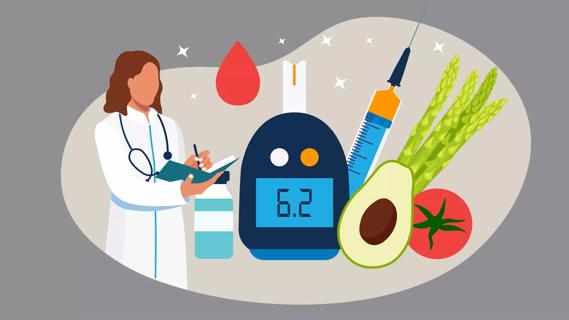Gum disease can affect your insulin

Gum disease, also known as gingivitis, has been called the fifth complication of diabetes behind heart, nerve, kidney and eye disease. Gingivitis is simply the inflammation of the gums around your teeth caused by plaque buildup.
Advertisement
Cleveland Clinic is a non-profit academic medical center. Advertising on our site helps support our mission. We do not endorse non-Cleveland Clinic products or services. Policy
So, why are you more at risk for developing gingivitis if you have diabetes? Diabetes educator Sue Cotey, RN, sheds some light on this question.
Gum disease begins with bacteria build up on and around your teeth that extends into the gums. Cotey says there is no difference between the bacteria in the mouth of someone with diabetes compared with someone without diabetes. “The reason gum disease is worse if you have diabetes is because you have a greater inflammatory response to this bacteria,” she explains.
If you develop gum disease and it’s left untreated, it can lead to something called periodontitis, or an erosion of your jaw bone. This, in turn, can lead to loose teeth and damage to the gums. People with uncontrolled diabetes tend to get periodontitis more often than the average person or those who keep their diabetes under control.
Some signs that you have gum disease include:
If you have diabetes and have moderately advanced periodontal disease, it can be more difficult for you to control your blood sugars. “You may need deep cleaning, antibiotics or even oral surgery depending how advanced the gum disease is,” Cotey says.
Advertisement
In her 25 years of being a diabetes educator, Cotey says she has seen firsthand the relationship between gum health and diabetes management. “I’ve witnessed on multiple occasions that when people with diabetes see the dentist and address any current issues related to gum disease or inflammation, their blood glucose levels respond almost immediately,” says Cotey.
Follow these tips to steer clear of gum disease:
People with diabetes are also more likely to have a dry mouth due to elevated blood glucose or medications. To avoid dry mouth, Cotey recommends chewing sugar-free gum, using a mouth gel or eating some sugar-free candy to stimulate saliva production. “If these don’t help, talk to your dentist for recommendations,” she says.
And if you’re into having a super white smile, you’re in luck! Cotey says many over-the-counter teeth whiteners are mild enough to be used by people with diabetes too.
Advertisement
Learn more about our editorial process.
Advertisement

Hot, humid weather can affect your blood sugar levels and even cause dehydration or heat stroke

The good news? Prediabetes can be erased with healthy lifestyle changes, including eating more nutritious foods

Fresh or frozen fruits that are low on the glycemic index should be your go-to, as they’re full of fiber and other nutrients

Adding nuts like pistachios, almonds or pecans to your diet can help manage blood sugar levels

A diabetes diagnosis, new or long-standing, can trigger reactions like grief, stress, depression and frustration, but symptom relief and help are available

The short answer: Yes, but you need to eat it in moderation and keep track of how much you consume

Sweet potatoes are great, but sweetened drinks aren’t so great

Some sweeteners may have health risks, so it’s best to keep your intake moderate

The tropical fruit is a good source of antioxidants and vitamin C

Most people fall asleep within 10 to 20 minutes, but if your experience is different, adjusting your sleep schedule may help

Exploring your hidden side can lead to better understanding of what makes you tick